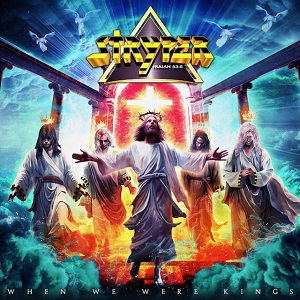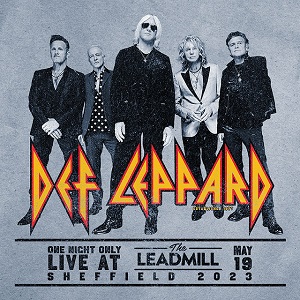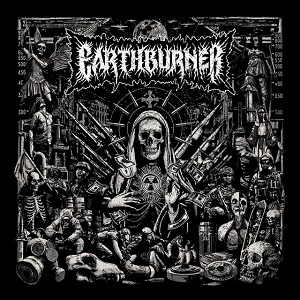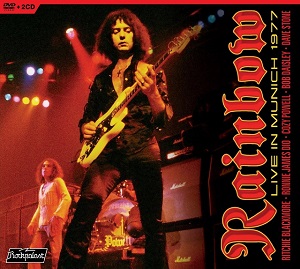SLAYER - Final Excerpt From Joel McIver's The Bloody Reign Of Slayer Book Available
May 23, 2008, 16 years ago
Author Joel McIver has issued the following update:
"Once again, here's a chance to read some of my forthcoming SLAYER biography. To order the book from Amazon, click here.Feel free to sign the guestbook while you're here -- it's on the Contact page."
The final excerpt from The Bloody Reign Of Slayer, to be published on June 9th, reads:
‘Angel Of Death', was – quite apart from its musical qualities – a shock to the established Slayer fan because it sounded so crisp and immediate. The murky shroud that obscured the finer elements of songs on the earlier records was gone, whisked away as if by a breath of ice-cold air: King's opening guitar riff, although loaded with distortion, stands out clearly at all frequencies. It's interesting to speculate how much of this came directly from Rubin, his skilled engineer Andy Wallace (who went on to be a much in-demand metal producer in his own right) or simply from the superior LA studio and mastering facilities which could be used thanks to the ample Def Jam budget.
After that snaky opening riff, the band punctuate the track with a series of unison stabs and Araya launches the most shattering death-scream ever uttered on record, modulating it into a roar as it dies away in time for the song's verse riff. Musically, the song is pure genius – perhaps Hanneman's finest work. There's a totally unexpected key change in the first verse (at the line “Forced in, like cattle you run”); the slow, extended section in the middle is based on an unforgettable riff that has gone down as one of thrash metal's finest; a duelling lead section, featuring Hanneman and King swapping solos over an ever-intensifying backing riff that leaps a fourth higher at each change; and a few seconds of Lombardo showing off his double kick-drum prowess near the end.
The devastating opening line of “Auschwitz / The meaning of pain…” made it immediately clear that Slayer were no longer confining themselves to lyrics about Satan. The song lists in agonising detail the torture and human experimentation meted out on the inmates of the Auschwitz death-camp in World War II by Nazi scientist Josef Mengele. The listener wouldn't necessarily pick this up from the lyrics without some education on the subject (although a clue to the subject is provided by the lines “Destroying, without mercy / To benefit the Aryan race” and “Sickening ways to achieve the Holocaust”), with Mengele referred to only by his real-life sobriquet of the ‘Angel Of Death'. Araya's syllable-perfect enunciation takes the listener through a gratuitous river of gore in which the “pathetic harmless victims” are sequentially subjected to “surgery, with no anaesthesia”, pumped with fluid, burned, frozen, “sewn together”, “abacinated” (eyes burned out), injected with substances and have their eyes dyed a different colour.
A storm of protest blew up when Reign hit the stores. The problem for many observers (in particular those representing society's moral code) was not the grisly imagery, it was the fact that Hanneman did not condemn or negatively judge Mengele's actions. He simply reported them, which was deemed by some to be at best in poor taste and at worst a gesture of approval. Over the next two decades the band were called to task over ‘Angel Of Death' hundreds, perhaps thousands, of times, and on each occasion they denied that they were Nazis, neo-Nazis, fascists, racists, anti-Semites, white supremacists or in any way particularly right-wing or intolerant.
Hanneman was asked time after time if he sympathised with the acts of Mengele: a typical answer was one he gave to the NME in March 1987: “I feel you should be able to write about whatever you want. ‘Angel Of Death' is like a history lesson, but as soon as we released it everybody was calling us Nazis. Our singer's a dark-skinned Chilean, there's no way we're fascists. I'd read a lot about the Third Reich and was absolutely fascinated by the extremity of it all, the way Hitler had been able to hypnotise a nation and do whatever he wanted, a situation where Mengele could evolve from being a doctor to being a butcher.”
Those who have worked with Hanneman are quick to point that he's far from being a Nazi sympathiser. Photographer Ross Halfin says: “People don't get it – it's all right for the Stones or Lemmy to dress up as Nazis, but as soon as he does it, it's all, ‘Oh, he can't do that'. The thing is, Slayer don't mean it. They're not some far-right band at all.”
Jeff himself explained: “Right before I wrote ‘Angel Of Death', I read a bunch of books about Mengele because he was pretty sick. That was how ‘Angel Of Death' came about… I know why people misinterpret it – it's because they get this knee-jerk reaction to it. When they read the lyrics, there's nothing I put in the lyrics that says necessarily he was a bad man, because to me – well, isn't that obvious? I shouldn't have to tell you that.”
This stance of refusing to pass judgment and allowing the listener to draw his or her own conclusions has been typical of Slayer over the years. Araya was once informed by an interviewer that the Slayer website forum was attended by a number of racists and asked if he had a message for those people – to which he responded: “I'm not white, so I don't think I need to send out a message. I've noticed it and met people that are into that. I have no problems with people's beliefs and how they want to live their lives, but just don't fuck with me.”
While the memorable opening track would seem hard to follow, ‘Piece By Piece' was just as fast, heavy and as lyrically uncompromising as ‘Angel Of Death'. One of the first songs which might be classified as ‘gore-metal' before bands such as Autopsy took that approach to its logical, queasy limit, ‘Piece…' originally began with a bass intro, replicating the opening whole-band riff. This was removed, however, and the song begins with a fat, lumbering riff that accelerates after 23 seconds to one of the fastest tempos Slayer had yet attempted.
“Modulistic terror!” barks Araya mysteriously, before embarking on a tale of death and dismemberment, the like of which hadn't been seen too often on the metal scene, only adding more fuel to the fire of controversy. King was the songwriter this time, coming up with lines like “Bones and blood lie on the ground / Rotten limbs lie dead / Decapitated bodies found / On my wall your head”. More importantly, Kerry amped up a device used on previous songs such as ‘Fight Till Death' where the band execute a fast chord change at an odd place in the bar – in this case under the last word of the line, ‘As soon as life has left your corpse…”This unexpected device, which goes against all previous riff-writing rules, lends the song an air of unpredictablity and instability, as if the band might implode at any second. It's this air of impending destruction which gives Reign In Blood its sense of engorged energy.
On first listen it appeared hilarious that the very fast ‘Angel Of Death' was followed by the even faster ‘Piece By Piece' – but it was stupefying when track three was faster still. The unearthly ‘Necrophobic' – like ‘Chemical Warfare' two years before – was the fastest song ever written at the time, by Slayer or anyone else. How the band conceived, wrote and recorded at such phenomenal speed was hard to understand back then, although the fact that it's a Hanneman/King co-write is obvious, with both men's lust for fast metal now renowned. Asked how he played at such ferocious speed night after night, King reasoned: “To me, it's like if you're working out and you go from lifting 20 pounds to 50 pounds. You don't lift 20 pounds and then say, ‘Hey, I'm going for 50.'
“When I warm up before a show I start out by playing ‘Propaganda' by Sepultura, because it's got some pedalling, but it's not fast pedalling. I don't warm up with, say, ‘Angel Of Death', because if you cramp up it blows your gig. I'll warm up with something slow and then build up to where I need to be in an hour. My goal before a gig is to play the fastest riffs in the set, so I'll make a point of getting ‘Angel Of Death' down…. If I had to play [it] today, I probably couldn't, because I've had five weeks off – but my hands are trained to bounce back…”‘Necrophobic' – which was often confused with the Hell Awaits track ‘Necrophiliac' - describes someone who is “scared to die” and is basically a shouted list of ways to expire, from “Strangulation, mutilation, cancer of the brain” to “Skin contortion, bone erosion” less than two minutes later. In that frantic 100 seconds or so, the band whip through no fewer than nine verses (there's no chorus as such), a solo section – featuring the most gripping leads yet, aided by a delay loop at the end – and a final, catastrophic crash to an end. Araya has clearly honed his act, spitting out the words with perfect clarity despite the ridiculous speed, and Lombardo is a powerhouse, delivering his most intense performance yet.
Further information here.











